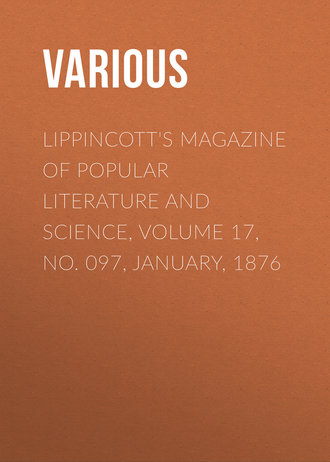 полная версия
полная версияLippincott's Magazine of Popular Literature and Science, Volume 17, No. 097, January, 1876
Her married life lasted thirty-seven years, and she survived her husband nearly thirty more, dying in 1858 at the age of eighty-seven. Her career was, on the whole, one of singular happiness and prosperity, made so in part by fortunate circumstances, but in a still greater degree by her sunny temperament, her power of attracting and retaining friends, her unflagging interest in public affairs and her unshaken belief in human progress. Jeffrey and Brougham were among her earliest friends, Carlyle and Mazzini among her latest, and there have been few Englishmen of note in the present century whose names do not appear in the list. Unfortunately, they appear for the most part as names only. They occur incidentally in a record intended not for the public, but for the writer's own family, whose interest in her personal history needed no stimulant and called for no extraneous details. Here and there we find a passage calculated to whet if not to satisfy a more general curiosity, such as the account of a conversation with Wordsworth after his return from Italy in 1837, and some letters from Mazzini written soon after his first arrival in England, But even these belong not to the memoir itself, but to the editor's additions. The book is therefore not to be judged by a mere literary standard, or read with expectations founded on a general knowlege of the writer's position and associations. On all with whom she came in contact Mrs. Fletcher produced the impression of a character singularly round and complete. Something of the same influence is felt in the perusal of her unaffected narrative, and with readers of a reflective turn may prove a sufficient compensation for the lack of more ordinary attractions.
Books Received
Notes on the Manufacture of Pottery among Savage Races. By Ch. Fred. Hartt, A.M. Rio de Janeiro: Printed at the office of the "South American Mail."
The History of My Friends; or, Home-Life with Animals. Translated from the French of Emile Achard. New York; G.P. Putnam's Sons.
The Cultivation of Art, and its Relations to Religious Puritanism and Money-Getting. By A.R. Cooper. New York: Chas. P. Somerby.
Health Fragments; or, Steps toward a True Life. By Geo. H. Everett, M.D. New York: Chas. P. Somerby.
Sewerage and Sewage Utilization. By Prof. W.H. Corfield, M.A. New York: D. Van Nostrand.
Notes of Travel in South-western Africa. By C.J. Andersson. New York: G.P. Putnam's Sons.
St. George and St. Michael: A Novel. By George Macdonald. New York: J.B. Ford & Co.
Water and Water-Supply. By W.H. Corfield, M.A., M.D. New York: D. Van Nostrand.
Home Pastorals, Ballads and Lyrics. By Bayard Taylor. Boston: James R. Osgood & Co.
Soul Problems, with other Papers. By Joseph E. Peck. New York: Chas. P. Somerby.
Scripture Speculations. By Halsey R. Stevens. New York: Charles P. Somerby.
Antiquity of Christianity. By John Alberger. New York: Chas. P. Somerby.
The Ship in the Desert. By Joaquin Miller. Boston: Roberts Brothers.
1
Although the various states of Italy were conquered by Rome before Greece was, it is probable that emphyteusis was not employed in those states until after the year B.C. 146—between that and B.C. 120.
2
The Mondega annually overflows its banks, changes its course and buries thousands of once fertile acres under sand and stones; the Vonga has converted the once productive land between Aveiro and Ovar into a vast morass; the Douro is periodically converted into a frightful and resistless torrent which sweeps everything before it.
3
Prize Essay on Portugal, London, 1854.
4
Parliamentary Papers, London, 1870.
5
Estudos Estatisticos, hygienicos e administrativas sobre as doenças e a mortalidade do exercito Portuguez, etc., by Dr. José Antonio Marques, Lisbon, 1862.
6
Doria, p. 184.
7
The Registrar-General of England.
8
L.A. Rebello da Silva (minister of marine), Economia. Rural, Lisbon, 1868.
9
It is understood, of course, that the census figures of births are admittedly and grossly inaccurate.
10
Porter's Progress, p. 21.
11
During the thirteen years from 1840-52 the number of children deposited in the Oporto foundling was 15,608, of whom no less than 11,310, or 72.4 per cent.—nearly three-fourths—died while in the hospital. Most of the remainder died during infancy after leaving the hospital.
12
In some districts of Portugal the proportion of married to single persons is as 1 to 173!









